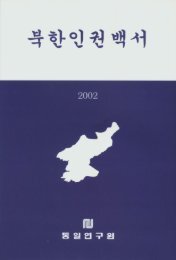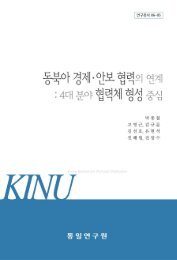- Page 1:
KINU Research Monograph 09-15 Peace
- Page 4 and 5:
Peace-keeping in the Korean Peninsu
- Page 6 and 7:
CONTENTS Acronyms Preface Acknowled
- Page 8 and 9:
CONTENTS 4.3 North-South Dialogue a
- Page 10 and 11:
CONTENTS Appendix ········
- Page 12 and 13:
Acronyms AA Armistice Agreement ASM
- Page 14 and 15:
Preface This monograph is the resea
- Page 16 and 17:
Acknowledgements Firstly, I wish to
- Page 19 and 20:
Chapter 1 Introduction
- Page 21 and 22:
(DMZ): “An invisible war now cont
- Page 23 and 24:
formation takes place nonviolently.
- Page 25 and 26:
the same criteria. The game theory
- Page 27 and 28:
News Agency, one article from a jou
- Page 29 and 30:
is the 1953 Armistice Agreement, wh
- Page 31 and 32:
1.6 Korean Names and Terminology Ko
- Page 33 and 34:
Chapter 2 The Foundation of the MAC
- Page 35 and 36:
pended, how the suspensions were en
- Page 37 and 38:
However, following strong pressure
- Page 39 and 40:
flag rank.” The other two “...
- Page 41 and 42:
secret designs or characteristics o
- Page 43 and 44:
hospital). To implement its tasks,
- Page 45 and 46:
cations themselves. In contrast, Sw
- Page 47 and 48:
as an “aide” and a soldier to c
- Page 49 and 50:
the way, reloading could freely be
- Page 51 and 52:
“Checks at the railway stations h
- Page 53 and 54:
the inspection teams did not work w
- Page 55 and 56:
fighter planes in transport contain
- Page 57 and 58:
Korea whether prisoners of war were
- Page 59 and 60:
armistice North Korea began to buil
- Page 61 and 62:
econnaissance flights by one airpla
- Page 63 and 64:
asserted that its investigation of
- Page 65 and 66:
On November 16, a North Korean comp
- Page 67 and 68:
taken photos. 41 The South admitted
- Page 69 and 70:
than at the plenary meetings. Howev
- Page 71 and 72:
ment rejected the proposal for pass
- Page 73 and 74:
the Korean issue should be transfer
- Page 75 and 76:
dispatched to investigate the incid
- Page 77 and 78:
At the 63rd MAC meeting proposed by
- Page 79 and 80:
Marshal General Headquarters. 52 Ar
- Page 81 and 82:
According to Weilenmann (2004), sin
- Page 83 and 84:
1953, was the first man to point ou
- Page 85 and 86:
Treaty that obligated the US to com
- Page 87 and 88:
were committed by North Korea and t
- Page 89 and 90:
without any harm to the armistice c
- Page 91 and 92:
ports of entry had reached a dead e
- Page 93 and 94:
earming South Korea in violation of
- Page 95 and 96:
the NNSC to work in North Korea and
- Page 97 and 98:
At the same time, the South Korean
- Page 99 and 100:
emaining teams became “subteams
- Page 101 and 102:
ment “... regulating the activiti
- Page 103 and 104:
violating Paragraph 13(d). The UNC/
- Page 105 and 106:
The UNC/MAC representative maintain
- Page 107 and 108:
Wigforss, pointed out the symbolic
- Page 109 and 110:
menting its provisions had become i
- Page 111 and 112:
to establish that the plane was arm
- Page 113 and 114:
The UNC informed the NNSC about its
- Page 115 and 116:
pointed out that the North abused t
- Page 117 and 118:
an informal meeting in the part of
- Page 119 and 120:
Swiss view was again that the issue
- Page 121 and 122:
alance. In a missive letter from th
- Page 123 and 124:
NNSC to reduce tension in the Far E
- Page 125 and 126:
Affairs that work was mainly routin
- Page 127 and 128:
2.9 The Parties’ Views of the NNS
- Page 129 and 130:
were also invited to get some orien
- Page 131 and 132:
negative peace. The defection from
- Page 133 and 134:
existence of a neutral commission w
- Page 135:
the 1956-57 events a dissolution wa
- Page 138 and 139:
3.1 Introduction As we saw in Chapt
- Page 140 and 141:
President Franklin D. Roosevelt’s
- Page 142 and 143:
Kim (2003) notes that since the sup
- Page 144 and 145:
The military build-up repeatedly ca
- Page 146 and 147:
illion in 1967. 106 This extraordin
- Page 148 and 149:
As in the late 1950s, the KPA/CPV u
- Page 150 and 151:
for about ten years but from the su
- Page 152 and 153:
When large-scale North Korean intru
- Page 154 and 155:
was foolish; the issue was an inter
- Page 156 and 157: When the 227th meeting proposed by
- Page 158 and 159: incidents had been fabricated by th
- Page 160 and 161: data, that he was not a returning d
- Page 162 and 163: on American and South Korean forces
- Page 164 and 165: 14, at about 11 P.M., shortly befor
- Page 166 and 167: number of killed South Koreans fell
- Page 168 and 169: woman who sold eggs in the village.
- Page 170 and 171: October 21, 1966 armed ambush of a
- Page 172 and 173: Before the UNC/MAC at the 289th mee
- Page 174 and 175: harvest holiday) celebration. Accor
- Page 176 and 177: demand was repeated at the followin
- Page 178 and 179: As we have seen, in 1958 Joint Obse
- Page 180 and 181: sequently removed the bodies from t
- Page 182 and 183: to fish in territory that extended
- Page 184 and 185: KPA/CPV convened on August 5, 1966,
- Page 186 and 187: abductees were that North Korean au
- Page 188 and 189: informed of the result when availab
- Page 190 and 191: and kidnappings of fishermen had be
- Page 192 and 193: was shot down close to the Swedish
- Page 194 and 195: in the air. 143 At the 206th meetin
- Page 196 and 197: North Korea over the East Sea 50 mi
- Page 198 and 199: the words of Mobley (2003), a “ca
- Page 200 and 201: outine training mission, with a cre
- Page 202 and 203: lost and therefore flew into your t
- Page 204 and 205: 3.6 The Work of the MAC and the NNS
- Page 208 and 209: His compatriot Chief of Staff, Majo
- Page 210 and 211: een fighting an ideological war at
- Page 212 and 213: parties, thereby easing tense relat
- Page 214 and 215: among the armistice parties that th
- Page 216 and 217: Nonetheless, the woodcutters report
- Page 218 and 219: estimated its risks. His view is sh
- Page 220 and 221: According to Downs (1999), on the a
- Page 222 and 223: which had not suffered a seizure in
- Page 224 and 225: aggressors.” The “South Korean
- Page 226 and 227: etaliation. Considering the game th
- Page 228 and 229: According to the Swedish NNSC Deleg
- Page 230 and 231: Pak tried to draw out the complete
- Page 232 and 233: North Korea without South Korea’s
- Page 234 and 235: of the 661st Unit of the Korean Peo
- Page 236 and 237: The general reiterated that the ass
- Page 238 and 239: should refuse to abandon their pres
- Page 240 and 241: discuss specific arrangements for t
- Page 242 and 243: of 82 former crew members of the Pu
- Page 244 and 245: Following the signing of the docume
- Page 246 and 247: water zone claimed by North Korea a
- Page 248 and 249: Offensive launched in late January,
- Page 250 and 251: controversial at the top-political
- Page 252 and 253: assassination attempt on President
- Page 255 and 256: Chapter 4 North-South Dialogue and
- Page 257 and 258:
NNSC played during the crisis but i
- Page 259 and 260:
The October 9 incident was raised a
- Page 261 and 262:
side of it not had made a request.
- Page 263 and 264:
The outcome was two against and two
- Page 265 and 266:
ecorded in Chapter 2 of having an e
- Page 267 and 268:
On October 24, the NNSC had receive
- Page 269 and 270:
for the first time to acknowledge r
- Page 271 and 272:
was going on in Panmunjom.” He co
- Page 273 and 274:
South Korea that were a battle for
- Page 275 and 276:
Seoul by Yi Hu-rak, Head of the Kor
- Page 277 and 278:
egarded as a stronger indication of
- Page 279 and 280:
workers carrying out routine work f
- Page 281 and 282:
strengthened its war preparations b
- Page 283 and 284:
military exercises. The South denie
- Page 285 and 286:
y the KPA/CPV held on January 26, 1
- Page 287 and 288:
een brought into the JSA and reject
- Page 289 and 290:
command are responsible for enforci
- Page 291 and 292:
UNC control. North Korea asserted o
- Page 293 and 294:
that the UNC and South Korea should
- Page 295 and 296:
clumsy and collided with the North
- Page 297 and 298:
North Korea admitted that it had su
- Page 299 and 300:
none of the crew could be rescued.
- Page 301 and 302:
then requested identification but s
- Page 303 and 304:
y the UNC/MAC, repeated the “stri
- Page 305 and 306:
KPA/CPV Senior Member, Major Genera
- Page 307 and 308:
North Korea also proposed to hold t
- Page 309 and 310:
maintained quiet discipline, but th
- Page 311 and 312:
Assembly, Second Session, convened
- Page 313 and 314:
tree should be pruned. That the tre
- Page 315 and 316:
As a result of the axe murder, the
- Page 317 and 318:
latter’s request addressed to the
- Page 319 and 320:
On August 21, work to cut down the
- Page 321 and 322:
and made an important contribution
- Page 323 and 324:
prevent the provocation. Our side w
- Page 325 and 326:
on August 28, the US repeated its d
- Page 327 and 328:
Why did the axe murder take place?
- Page 329 and 330:
According to Downs (1999), Presiden
- Page 331 and 332:
Since on November 15, 1974 steam as
- Page 333 and 334:
North Korean defector Kim Pu-sông
- Page 335 and 336:
Korean War to protect them from Ame
- Page 337 and 338:
North Korea to destroy all tunnels,
- Page 339 and 340:
past 25 years had a restraining and
- Page 341 and 342:
quo formed a “positive symmetry
- Page 343 and 344:
Chapter 5 Continued Tension but Ren
- Page 345 and 346:
loped in 1984-85 when a dialogue wa
- Page 347 and 348:
areas from the rear of the northern
- Page 349 and 350:
in 1981 and accusations of war prep
- Page 351 and 352:
of Korea. At the 417th meeting call
- Page 353 and 354:
also been raised at two previous me
- Page 355 and 356:
secretary meeting held on March 23,
- Page 357 and 358:
ground forces which had crossed the
- Page 359 and 360:
vessel followed the boat that was e
- Page 361 and 362:
under UNC and South Korean control
- Page 363 and 364:
The UNC/MAC claimed that the men we
- Page 365 and 366:
photographical and physical evidenc
- Page 367 and 368:
The North regarded the intrusion on
- Page 369 and 370:
the US make this assessment plausib
- Page 371 and 372:
opportunity to introduce security-a
- Page 373 and 374:
the name of the North Korean Red Cr
- Page 375 and 376:
NNSC conference room, as were the f
- Page 377 and 378:
In 1987, North Korea forwarded to t
- Page 379 and 380:
Korea’s liberation from Japan in
- Page 381 and 382:
the UNC/MAC Senior Member called th
- Page 383:
counterpart to provide humanitarian
- Page 386 and 387:
6.1 Introduction Tension continued
- Page 388 and 389:
protest to the South Korean governm
- Page 390 and 391:
of terror by the amassing of armies
- Page 392 and 393:
and were authorized to have officia
- Page 394 and 395:
women were invited to Seoul to part
- Page 396 and 397:
6.3 Reactivation of Dialogue and th
- Page 398 and 399:
the military demarcation line speci
- Page 400 and 401:
1991 Joint Declaration. When in May
- Page 402 and 403:
eopening Team Spirit, deploying Pat
- Page 404 and 405:
February 1998 were working contacts
- Page 406 and 407:
According to Lee (2001b), if the ap
- Page 408 and 409:
had invited North Korea to observe
- Page 410 and 411:
According to Lee (2001a), since 195
- Page 412 and 413:
were informally invited to P’yôn
- Page 414 and 415:
Korean peninsula.” 307 In contras
- Page 416 and 417:
since November 1984 (cf. pp. 349-35
- Page 418 and 419:
the US in reality signed the Armist
- Page 420 and 421:
US participated in the war to help
- Page 422 and 423:
meeting requested by the North, had
- Page 424 and 425:
the new organization demonstrativel
- Page 426 and 427:
new peace regime. The UNC/MAC respo
- Page 428 and 429:
asked forgiveness for his “grave
- Page 430 and 431:
was regarded as a preparation for w
- Page 432 and 433:
Armistice Agreement in accordance w
- Page 434 and 435:
At the second round of talks reques
- Page 436 and 437:
ecurrence, punishment of those resp
- Page 438 and 439:
characterized not only the MAC secr
- Page 440 and 441:
claimed: “North Korea’s claim t
- Page 442 and 443:
6.6 North Korea Expels the Czech Re
- Page 444 and 445:
the NNSC expressed its unanimous op
- Page 446 and 447:
that it would withdraw on April 10.
- Page 448 and 449:
friendly gesture was later interpre
- Page 450 and 451:
On February 9, the Deputy Head of t
- Page 452 and 453:
On February 24, the South Korean Fo
- Page 454 and 455:
oth sides; North Korea’s unilater
- Page 456 and 457:
According to the Swedish officer Bo
- Page 458 and 459:
Lhotska (1997), for both Sweden and
- Page 460 and 461:
However, what Mueller-Lhotska (1997
- Page 462 and 463:
evidently with their own consent to
- Page 464 and 465:
incident “only serves to further
- Page 466 and 467:
As we have seen, North Korea had on
- Page 468 and 469:
northern side when they were appreh
- Page 470 and 471:
signed the 1994 Agreed Framework th
- Page 473 and 474:
Chapter 7 Expanding Relations but C
- Page 475 and 476:
with previous periods. The account
- Page 477 and 478:
835,838 cases, 832,260 of them on l
- Page 479 and 480:
settling serious incidents have hel
- Page 481 and 482:
Korean governments began in 1972 to
- Page 483 and 484:
from the UNC. The investigation of
- Page 485 and 486:
achieve improvements in contacts in
- Page 487 and 488:
Agreement should be the basis for o
- Page 489 and 490:
enforced. Ten paragraphs remained i
- Page 491 and 492:
was no demand for navigation in the
- Page 493 and 494:
epatriation of prisoners-of-war was
- Page 495 and 496:
were held because of the building o
- Page 497 and 498:
In September, four meetings were he
- Page 499 and 500:
In 2002 and 2003, joint exhumations
- Page 501 and 502:
firing by machine guns had taken pl
- Page 503 and 504:
“...to ensure an independent and
- Page 505 and 506:
Paengnyông only about 12 kilometre
- Page 507 and 508:
In February, Swedish and Swiss NNSC
- Page 509 and 510:
7.4 Expansion of Inter-Korean Excha
- Page 511 and 512:
Whether this is true or not, two ye
- Page 513 and 514:
General Thomas A. Schwartz, stated
- Page 515 and 516:
The two Koreas’ different positio
- Page 517 and 518:
with the US continue was published
- Page 519 and 520:
energy supplies and technical aid.
- Page 521 and 522:
335). While the sunshine policy was
- Page 523 and 524:
to Kaesông to take place on Decemb
- Page 525 and 526:
services from December 1 in protest
- Page 527 and 528:
ealize this.” 385 On March 2, the
- Page 529 and 530:
“The successful launch of the sat
- Page 531 and 532:
the Demilitarized Zone and to the l
- Page 533:
the DMZ and observing US-South Kore
- Page 536 and 537:
8.1 Contributions of the MAC and th
- Page 538 and 539:
enormous damage. Also, it is virtua
- Page 540 and 541:
peace-keeping took place in differe
- Page 542 and 543:
Otherwise, its mere presence has he
- Page 544 and 545:
will remain so until it is replaced
- Page 546 and 547:
progress in the military field in p
- Page 548 and 549:
The axe murder is the only incident
- Page 550 and 551:
South Korea to the US. In the 1990s
- Page 552 and 553:
held in March 2009 is hard to asses
- Page 554 and 555:
Appendix Ⅰ Maps a) Map of the Kor
- Page 556 and 557:
) Map of the Joint Security Area be
- Page 558 and 559:
d) Buildings in the Joint Security
- Page 560 and 561:
Appendix Ⅱ Text of The Korean War
- Page 562 and 563:
Commission. Other personnel shall n
- Page 564 and 565:
(c) Cease the introduction into Kor
- Page 566 and 567:
prevent unnecessary delays, the use
- Page 568 and 569:
whom shall be appointed by the Comm
- Page 570 and 571:
33. The Joint Observer teams shall
- Page 572 and 573:
ment of its own as it may desire; p
- Page 574 and 575:
Sinanju............................
- Page 576 and 577:
hand them over to the Neutral Natio
- Page 578 and 579:
and shall visit the prisoner-of-war
- Page 580 and 581:
prisoners of war shall be delivered
- Page 582 and 583:
Article Ⅳ. Recommendations to the
- Page 584 and 585:
Appendix Ⅲ To the Stationmaster o
- Page 586 and 587:
August 8 At the ninth MAC meeting,
- Page 588 and 589:
November 16 At the 89th MAC secreta
- Page 590 and 591:
April 15 The UNC Commander in a let
- Page 592 and 593:
December 1 North Korea suggests a m
- Page 594 and 595:
August 6 At the 63rd MAC meeting, t
- Page 596 and 597:
armbands. July 1 The UNC Headquarte
- Page 598 and 599:
December 11 At the 90th MAC meeting
- Page 600 and 601:
March 3 At the 115th MAC meeting, t
- Page 602 and 603:
584 Peace-keeping in the Korean Pen
- Page 604 and 605:
June 24 At the 142nd MAC meeting, t
- Page 606 and 607:
October 22-23 Premier Kim Il Sung p
- Page 608 and 609:
August 19 At 186th MAC plenary meet
- Page 610 and 611:
September 30 The “Freedom House
- Page 612 and 613:
July 22 At the 227th MAC meeting, t
- Page 614 and 615:
596 Peace-keeping in the Korean Pen
- Page 616 and 617:
598 Peace-keeping in the Korean Pen
- Page 618 and 619:
March 22 North Korea reports that t
- Page 620 and 621:
December 30 At the 283rd MAC meetin
- Page 622 and 623:
October 23 At the 296th MAC meeting
- Page 624 and 625:
1971-1980 North Korea commits altog
- Page 626 and 627:
1972 January 26 At the 327th MAC me
- Page 628 and 629:
March 12 At the 337th MAC meeting,
- Page 630 and 631:
November- January 1974 612 Peace-ke
- Page 632 and 633:
614 Peace-keeping in the Korean Pen
- Page 634 and 635:
March 21 Defectors Kim Pu-sông and
- Page 636 and 637:
August 5 At the 378th MAC meeting,
- Page 638 and 639:
1978 The Swiss NNSC delegation is r
- Page 640 and 641:
North rejects the accusation. Augus
- Page 642 and 643:
624 Peace-keeping in the Korean Pen
- Page 644 and 645:
626 Peace-keeping in the Korean Pen
- Page 646 and 647:
October 31 At the 422nd MAC plenary
- Page 648 and 649:
630 Peace-keeping in the Korean Pen
- Page 650 and 651:
April 3 At the 437th MAC meeting, t
- Page 652 and 653:
634 Peace-keeping in the Korean Pen
- Page 654 and 655:
1991-99 310 corpses of American sol
- Page 656 and 657:
December 1991. October 1 South Kore
- Page 658 and 659:
January 19 North Korea declares tha
- Page 660 and 661:
April Both parties cease to supply
- Page 662 and 663:
December 1 South Korea acquires ope
- Page 664 and 665:
March 2 At the MAC secretary meetin
- Page 666 and 667:
November 14 At the MAC secretary me
- Page 668 and 669:
June 26 At the MAC secretary meetin
- Page 670 and 671:
June 22 At the seventh round of Gen
- Page 672 and 673:
2001 Six UNC/MAC Secretariat-KPA Se
- Page 674 and 675:
December The US cuts off oil suppli
- Page 676 and 677:
February 25-28 The second round of
- Page 678 and 679:
November 7 At the NNSC consultation
- Page 680 and 681:
August 8 North Korea blames the US
- Page 682 and 683:
Appendix Ⅴ Violations claimed by
- Page 684 and 685:
Appendix Ⅵ Types of Violations of
- Page 686 and 687:
e) 1990-1993 1990 1991 1992 1993 Ai
- Page 688 and 689:
c) 1970-1979 1970 1971 1972 1973 19
- Page 690 and 691:
Appendix Ⅷ Types of Issues raised
- Page 692 and 693:
1953 1954 1955 1956 1957 1958 1959
- Page 694 and 695:
1960 1961 1962 1963 1964 1965 1966
- Page 696 and 697:
1970 1971 1972 1973 1974 1975 1976
- Page 698 and 699:
1980 1981 1982 1983 1984 1985 1986
- Page 700 and 701:
Appendix Ⅸ Casualties from North
- Page 702 and 703:
Appendix Ⅹ Number of Proposed MAC
- Page 704 and 705:
Appendix XI KPA/CPV Senior Members,
- Page 706 and 707:
No Name Rank Mandate Period Number
- Page 708 and 709:
Appendix XIV Heads of Polish Delega
- Page 710 and 711:
Appendix XV Heads of Swedish Delega
- Page 712 and 713:
Appendix XVI Heads of Swiss Delegat
- Page 714 and 715:
Appendix XVII(a) The Neutral Nation
- Page 717 and 718:
Bibliography Ahlgren, Kjell. “Ins
- Page 719 and 720:
Commission in Panmunjom (Korea) 195
- Page 721 and 722:
[KINU], 2006, pp. 17-22. . “Puk h
- Page 723 and 724:
Europa Publications. The Far East a
- Page 725 and 726:
. Månadsrapport, mars 1975: Bilaga
- Page 727 and 728:
Harrison, William. Military Armisti
- Page 729 and 730:
. Slurapport: Bilaga: Generalmajor
- Page 731 and 732:
June 16, 2003. Accessed December 13
- Page 733 and 734:
Edition (2004-2006).] Hapch’am ch
- Page 735 and 736:
Means of Firing Power.”] In Kim,
- Page 737 and 738:
. “DMZ-nôn ôptta.” [“There
- Page 739 and 740:
day. Lerner, Mitchell B. The Pueblo
- Page 741 and 742:
Machiavelli, Nicoló. The Prince. C
- Page 743 and 744:
Norlin, Per. “Lugnt hos svenskar
- Page 745 and 746:
[Ministry of Foreign Affairs.] Prom
- Page 747 and 748:
Swedish Group NNSC. Slutrapport H:1
- Page 749 and 750:
. “MAC Meet: UNC Hits Dispatching
- Page 751 and 752:
Werner, Finn. Månadsrapport januar
- Page 753 and 754:
Agreed Framework / 384-5, 452, 499,
- Page 755 and 756:
408-409, 431, 456, 472, 522 Chinese
- Page 757 and 758:
in, 240, 249-250, 297 Julin, Sven /
- Page 759 and 760:
peace, 42, 186, 234, 258-9, 322-3,
- Page 761 and 762:
North Korea / 2, 3, 16, 17, 18, 19,
- Page 763 and 764:
P’yôngyang / 25, 89, 102, 111, 1
- Page 765 and 766:
Ulchin-Samch’ôk area/incident /
- Page 768:
Peace-keeping in the Korean Peninsu


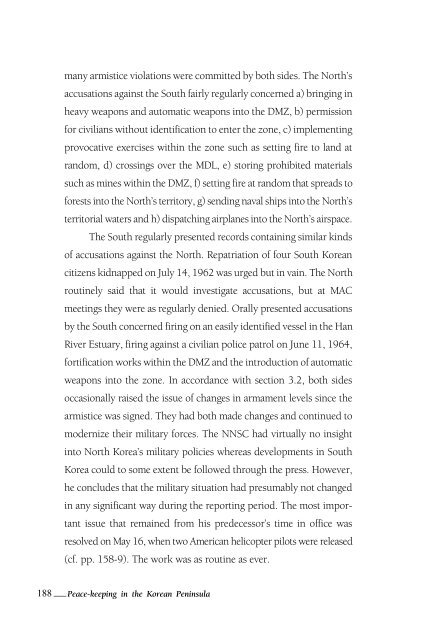


![2004-11.pdf [ë¤ì´:865] - íµì¼ì°êµ¬ì](https://img.yumpu.com/45980934/1/172x260/2004-11pdf-ei865-iui-1-4-ieui.jpg?quality=85)
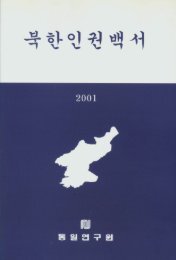






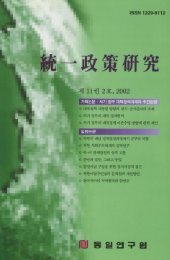
![p10-03.pdf [ë¤ì´:199] - íµì¼ì°êµ¬ì](https://img.yumpu.com/34181591/1/174x260/p10-03pdf-ei199-iui-1-4-ieui.jpg?quality=85)
